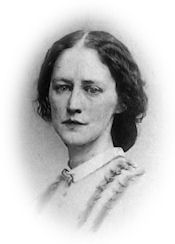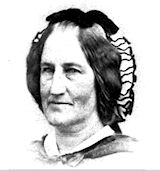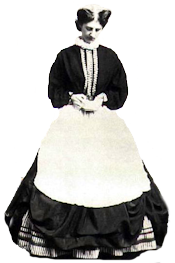December ‘61.
Dear Girls: “We are in the midst of stirring times,” as the newspapers say—or rather, stirring times are in our midst, as well as all around us. I am prepared to be astonished at nothing, and to regard all events with stoicism bordering on a fiendish glee. New York was sizzling on Monday and Tuesday; shops, omnibuses and everything, full of “don’t give ‘em up” and “come on, Britain.” Wm. Bond was here on Monday evening and said he never saw such a state of things down town. In their office they had drawn up a subscription paper among themselves for one privateer, with two rifled guns; to sail from New London.— “But I thought privateering was a sort of barbarism, Mr. Bond?” — “Oh, no. It is a relic of a bygone age; that is all.”—Mr. B. brought invitations to the breakfast at the Astor House to Gov. Buckingham and the officers of the 11th Conn. Mother, Abby and Charley went yesterday and had a very nice time. . . . The young line officers munched and crunched and giggled and clapped with the keenest enjoyment. The remarks about England were the same in tone that most sensible people make— “prove us wrong and we will apologize like gentlemen; if otherwise then otherwise.” . . . For my part, as to war with England; I do not see it where I stand. Infinite are the resources of diplomacy, and Mr. Seward and Mr. Lincoln are cool hands.—What a horribly satisfactory thing the burning of Charleston is — retribution from within; — Sumter avenged without our responsibility. There is something quite dramatic in the denouement. “As the captain of the Illinois came by, the whole sky was one red glare, with the outlines of Fort Sumter black against it.” . . . A note from Sarah Woolsey says she will be here to-night. I shall take her round to some of the fairs and things of which there is no end. The Union Bazaar is the biggest. Stewart gives a shawl—$1,500—to be raffled for; Dr. Hughes a bronze statue, ditto; Miss King a doll bride with trousseau, trunks, French maid, etc., all complete, ditto; and so on. They took in $3,000 the first night. We have just sent off a lot of old party dresses to the Tracys for doll finery, everything we could find; you may miss something familiar when you come back. . . . I observe that when you write two sheets you speak of it as a letter. When I do it becomes a note.—We had a lot of little things already collected for F. B. and shall send them on as a little Christmas box without waiting to hear. I am going to put “Spare Hours,” by author of Rab, in the box, and the jolliest tin canister of bonbons “as ever you see.” . . . Anna Rockwell read us a lot of interesting letters from Charles. He is “heading home” now; he belongs to the 7th; the 7th may have to turn out yet to garrison the forts. If there is war with England Robert says he shall enlist. . . .







